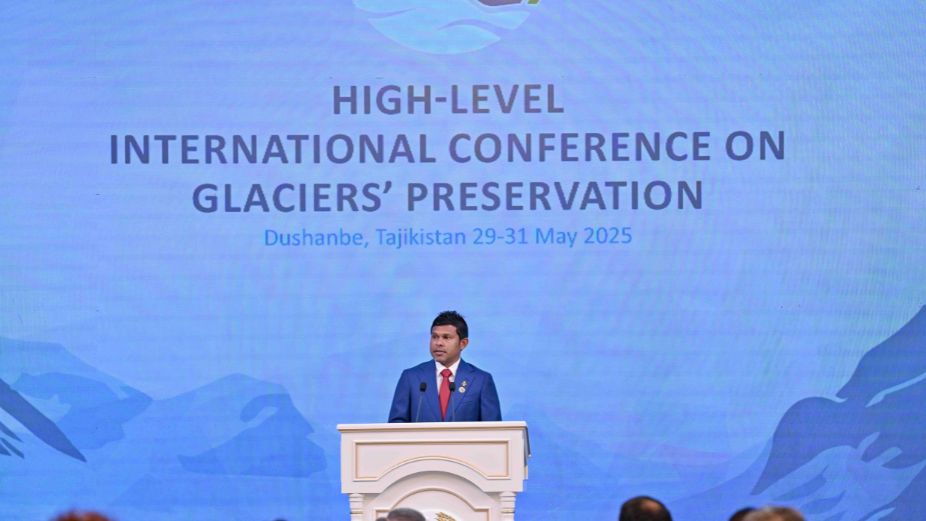
Vice President Uz Hussain Mohamed Latheef has called for urgent and unified international efforts to address the accelerating loss of glaciers and their wide-reaching implications yesterday. Speaking at the opening session of the High-Level International Conference on the Preservation of Glaciers, he conveyed the Maldives’ deep concern over this growing environmental crisis.
According to the President’s Office, in his remarks, the Vice President highlighted the Maldives’ proactive climate action through its submission of the third Nationally Determined Contribution (NDC) earlier this year. This updated NDC outlines a bold vision for resilience and low-carbon development. With international assistance, the Maldives targets a reduction of 1.52 million tonnes of emissions by 2035 and aims to generate 33 percent of its electricity from renewable sources by 2028.
The Vice President urged all nations to submit enhanced NDCs ahead of COP30, stressing the importance of increased ambition, transparency, and urgency. He cautioned that global commitments must be genuinely transformative to meaningfully address the climate crisis.
Recognising the disproportionate vulnerabilities of Small Island Developing States (SIDS), he called for more tailored international support. This includes access to concessional climate finance, adapted technologies, and robust capacity-building initiatives to support these nations’ specific development and adaptation needs.
He concluded by reaffirming the Maldives’ unwavering commitment to international cooperation in tackling glacier loss and broader climate threats. He highlighted the urgent need for strengthened solidarity and collaboration to confront melting glaciers and rising sea levels—issues that directly threaten the Maldives’ very existence.
Courtesy Call on Prime Minister of Tajikistan
During his visit to Tajikistan for the conference, Vice President Uz Hussain Mohamed Latheef paid a courtesy call on the Prime Minister of the Republic of Tajikistan, Kokhir Rasulzoda.
The meeting focused on expanding cooperation between the two nations, particularly in the areas of climate change adaptation and sustainable development. Both leaders recognised the Maldives as one of the most climate-vulnerable countries in the world and expressed a shared commitment to joint action.
Agricultural collaboration also featured prominently in their discussions, along with mutual interest in enhancing tourism ties. The Prime Minister acknowledged the Maldives’ international standing in the tourism sector and conveyed a keen interest in learning from its success to develop Tajikistan’s own tourism industry.
Both parties concluded the meeting with a firm commitment to further strengthen bilateral relations and pursue partnerships that offer mutual benefits.











